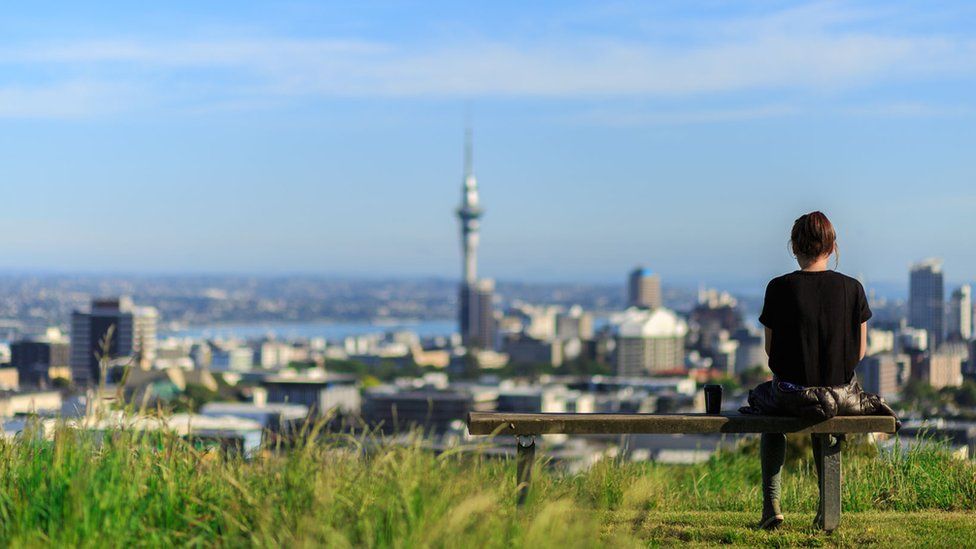Kiwis consider foreign house buyer ban
- Published

In one of the world's most liveable cities, and arguably its windiest, there are tough choices for prospective first-time property buyers in Wellington, where real estate prices soared by more than 18% in the year to June 2017.
For Sam, a mother in her thirties, the decision was unenviable; a baby or a house.
"It was basically making those hard choices whether (to) make our family larger and have another child (or) to try to get a house because you can't really do both at the same time," she told BBC News. "It is hard. I'm trying to convince my partner to move elsewhere."
Last year, national median average house prices increased by 5.8% to 550,000 New Zealand dollars ($405,000; £290,000), while in Auckland, the country's most expensive city, they rose by 1.8% to NZ$870,000, according to the Real Estate Institute of New Zealand.
The new Labour-led government blames, in part, foreigners for runaway prices that have squeezed many Kiwis out of the market. It wants to ban non-residents from purchasing existing residential properties and farms.
"I am trying to protect New Zealanders against some of the excesses of global capitalism," trade minister David Parker said.
"We think that some of the difficulties that are arising in politics around the world are driven by an insecurity of middle class citizens in their own country who feel that their interests are being sold out to the interests of this super-wealthy cohort."
Chinese investors have been among the biggest offshore buyers, and political commentator Bryce Edwards says a ban on foreign purchasers reflects a degree of intolerance in the community as well as concerns about the super-rich.
"Ever since the global financial crisis of 2008 there has been a bit more radicalism in New Zealand politics. There's been much more focus on inequality (and) more concentration on the wealthy as maybe a source some of our problems.
"There is an ethnic element to it as well that is perhaps xenophobic or even racist. There has been a great increase in Asian wealth coming to New Zealand and New Zealanders are a bit more suspicious of that."
Twenty-five years ago, about three-quarters of Kiwis owned their own homes; now it's 64% and falling.
Norman Gemmell, the public finance chair at Victoria University, believes there are sound reasons to shut the door on property speculators from overseas.
"There is a sensible economic argument that says: if lots of foreign investors are looking to put their cash into New Zealand, if it then forces up the price of property, you should think about what is the right way to allocate your domestic housing stock.
"You don't want local residents being forced out."
Other countries have taken measures to restrict foreigners' ability to buy property. Switzerland, for example, has had restrictions in place since the 1960s, Singapore and Hong Kong both impose extra taxes on foreign buyers, and Vancouver in Canada introduced a surcharge in 2016.
Critics of the populist measure in New Zealand say it will affect only a small part of the property sector, and won't improve affordability.
There are concerns, too, that non-residents could circumvent the rules by getting friends and relations to buy on their behalf. But arguments on both sides are muffled by a lack of precise data about how much of a grip international buyers have on the country's housing market.
"The best evidence is that they are responsible for about 3% of purchases and about 2% of sales, so the net effect is about 1%," says Steven Joyce, the opposition's National Party's finance spokesman.
"The biggest causes (of house price rises) are undoubtedly very high asset prices worldwide as a result of very low interest rates and a very large availability of money post the [global financial crisis], which New Zealand gets caught up in."
A lack of supply has also played a part, as has immigration: the annual net migration rate is 70,000 people, or about 1.5% of the population.
Restrictions on foreign ownership could also stem the flow of those with very deep pockets - including the US tech entrepreneur and Trump adviser, Peter Thiel - who have looked for citizenship and sanctuary in this corner of the Pacific.
"High profile, very wealthy people from the northern hemisphere have sought to gain access to New Zealand residency as a bolthole and there have been reasons, of course," says professor Paul Spoonley of Massey University.
"It is politically stable, reasonably well-run, it is economically safe and it is a long way from the world's hotspots."
But the adventures of the ultra-rich matter little to those who see the Kiwi dream of owning a home slipping away.
"I rent and it is expensive," one weary house-hunter tells me in Wellington.
"I don't know if I'll ever be able to buy a home. I want to. I have no idea how people can afford it. It is so much money. Probably easier just to buy a boat. Live on a boat and you can sail away."